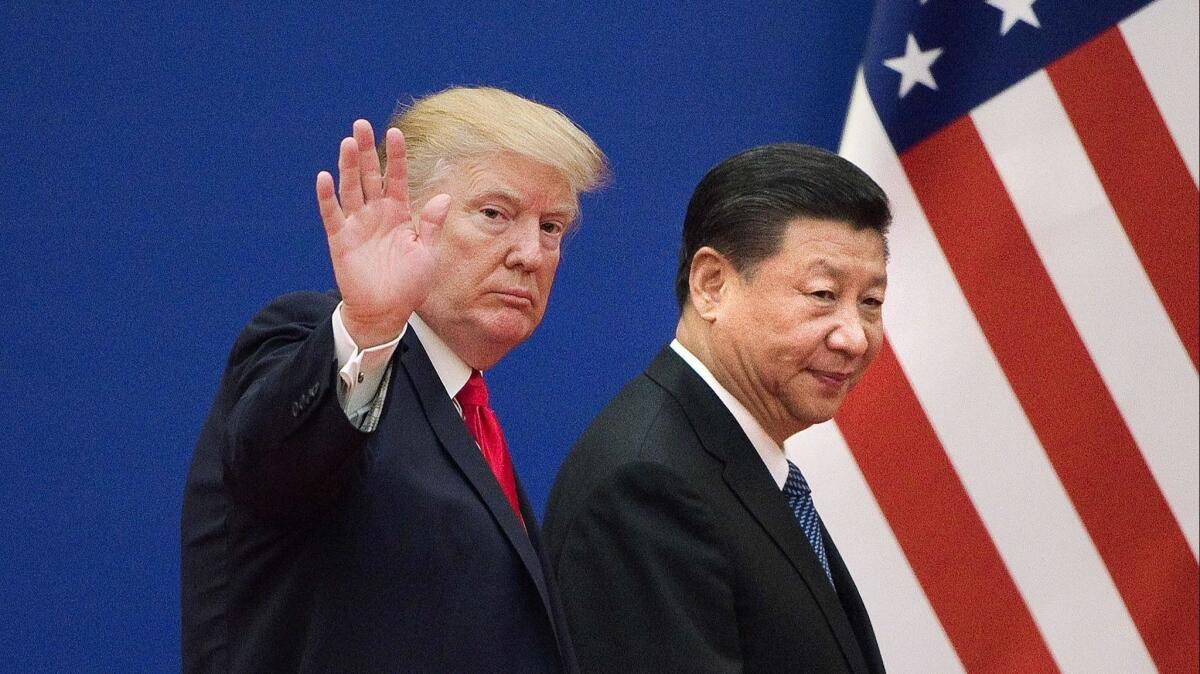Readers React: Trump’s completely unnecessary trade war

Good morning. I’m Paul Thornton, and it is Saturday, March 24, 2018. Multiple March for Our Lives events will take place in the L.A. area; click here to find out where they are. Let’s take a look back at the week in Opinion.
As a presidential candidate, Donald Trump bashed China. A lot. It was perhaps the most normal thing he did before his improbable election victory, as China — the land of communism, cheap manufacturing and lax enforcement of intellectual property laws — serves as the perennial bipartisan antagonist.
But U.S. policy on China gives Trump a chance to display both his most admirable qualities and his total recklessness: On the one hand, the president deserves credit for following through on an oft-made promise that his predecessors failed to fulfill; and on the other, Trump seems willing to disrupt the American economy and our fragile relationship with China, no matter the consequences.
And it’s the potentially dire consequences of the president’s recent decision to slap up to $60 billion worth of tariffs on Chinese imports that troubles The Times Editorial Board:
China's bad trade practices were damaging enough when the country was mainly a source of cheap consumer goods. But now that China's industrial policy is focused on dominating such crucial 21st century fields as health sciences, artificial intelligence and aerospace, the stakes are considerably higher.
That's why Trump's tough talk and actions are drawing plaudits from some lawmakers in both parties, whose patience with China has understandably grown thin. And two pieces of Trump's latest order — imposing restrictions on Chinese investments in the U.S. to match the ones China imposes on U.S. companies, and asking the World Trade Organization to rule against China's "discriminatory licensing practices" — are welcome steps that respect the WTO and international trade agreements that the U.S. has pushed the world to embrace.
On the other hand, it's hard to see how slapping tariffs on as-yet-identified products will induce China to honor intellectual property rights, permit more investment by U.S. firms or stop trying to steal trade secrets online. The tariffs will no doubt raise the price that U.S. consumers pay for those products. And they will just as surely prompt China to retaliate against U.S. exports, even as it finds new buyers for its own goods. That's been the result when the U.S. has unilaterally imposed tariffs in the past, and there's no reason to think the outcome would be any different this time.
Gov. Jerry Brown always makes for an interesting profile subject. California’s governor is indefatigable, rhetorically confrontational and refreshingly apolitical compared with his fellow progressive Democrats. Those of us who live here and have witnessed Brown’s five-decade political career know this, but the Trump presidency gives journalists a chance to rediscover California’s one-of-a-kind, retiring leader. Read the latest such profile, focusing on the state’s “war with Trump,” in the New Yorker.
The kids are the adults in the room. Teens and twentysomethings get a lot of grief these days for failing to get their act together (“adulting,” anyone?), but on gun control, it’s we grown-ups who have failed everyone, writes Ann Friedman. Today, as millions of these young people march in the streets because of Congress’ total inability to protect the country from gun violence, it’s worth remembering who’s slacking off and who’s getting their act together. L.A. Times
Please, don’t look away from his disabled child. Daniel T. Willingham’s daughter has trisomy-18, a rare chromosomal disorder that shortens life spans and gives those who have it a distinct appearance. Chances are you’ll notice someone like Willingham’s daughter and experience the urge not to stare. That’s understandable, but, Willingham writes, you should use it as an opportunity to get to know his daughter and interact with her. L.A. Times
Andrew McCabe will be fine. The rule of law might not be. The deputy FBI director’s sacking immediately before his retirement doesn’t mean McCabe will struggle financially or have trouble finding a job, writes former U.S. Attorney Harry Litman, but it “represents the most intense strike yet in Trump's overall assault on independent, apolitical law enforcement, an indispensable feature of our democracy.” L.A. Times
It rained. We need water. So why does L.A. send it straight to the ocean? Because precipitation affects each part of our remarkably geographically complex state differently, and when rain falls hard in Los Angeles, it can portend catastrophe. But, says The Times Editorial Board, taxpayers in Southern California will soon be asked to rework their flood-control system to capture more stormwater and rely less on imports from other parts of the state. L.A. Times
Reach me: paul.thornton@latimes.com
